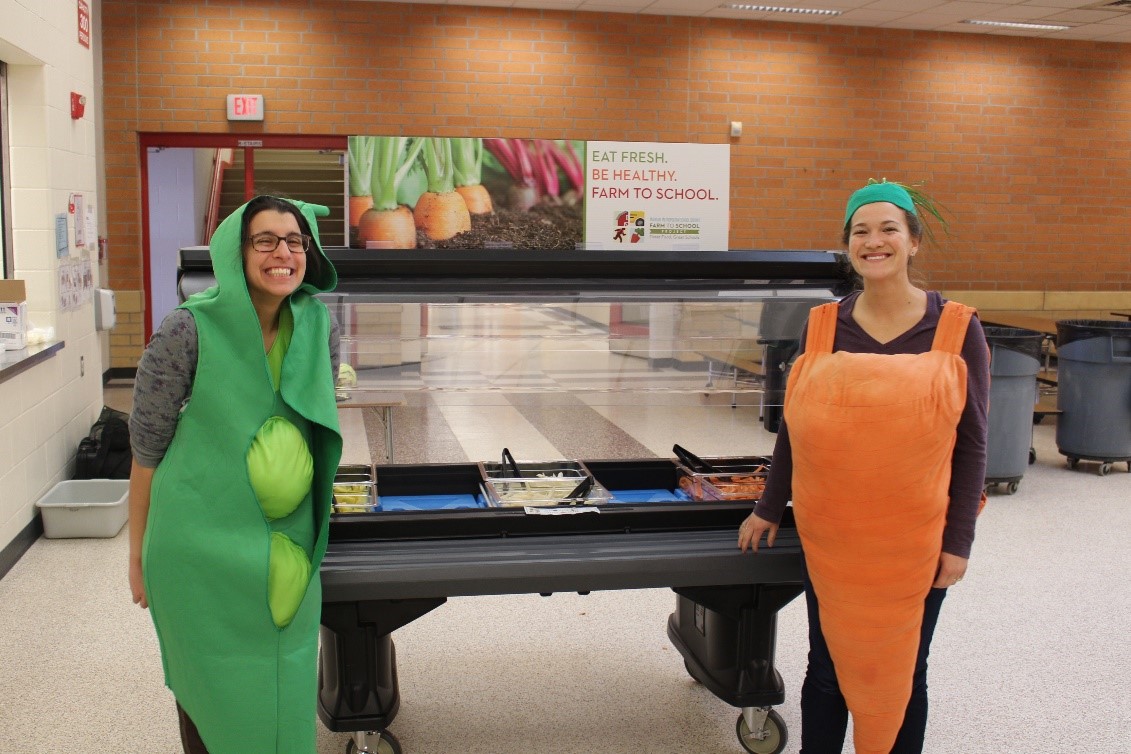Expanding Farm to School through Salad Bars
Let’s Move Salad Bars to Schools celebrated National Farm to School Month the entire month of October, paying homage to the hard work and dedication of food service professionals, farmers and educators across the country who connect their communities with fresh, healthy and local food. And what better way to finish out the month than to highlight one of the Let’s Move Salad Bars to Schools grantees who is using school salad bars as a vehicle to drive farm to school forward: Madison Metropolitan School District (MMSD) in Madison, WI which serves 27,000 students across 50 schools. We sat down with Food & Nutrition Director Steve Youngbauer and Food Service Coordinator Dustin Lundt to find out more.
Youngbauer’s idea to introduce salad bars into the lunchrooms first sprouted in 2012. At the time, meal service was limited to pre-packaged choices and many kids barely touched the food, throwing much of it in the trash. It was Youngbauer’s hope that introducing salad bars would allow him to serve more fresh and healthy options that would appeal to kids. Since then, the Let’s Move Salad Bars to Schools program has donated 13 salad bars to MMSD to help them accomplish that goal.

An elementary student gets help building her salad from a garden bar decked out in farm to school signage.
The Growth of the “Garden Bar” Program
Recognizing the importance of providing local produce, Youngbauer and Lundt rebranded the “salad bars” as “garden bars”. They chose to define the program by focusing on the garden, a place where a wide variety of fruits and vegetables are grown, not just for salads, but for lots of healthy eating choices.
And what would a garden be without the harvest? The bars have allowed Madison Metropolitan to expand their local procurement efforts, now sourcing 20% of all produce from Wisconsin farmers. That means apples, tomatoes, cucumbers, broccoli, cauliflower, carrot, sweet potatoes, and kohlrabi, all fresh from the farm. Madison “noticed that staple items can be cheaper when purchased locally.” “It’s really about finding the right balance with the farmers,” comments Lundt. Lundt manages the district’s relationships with eight farmers, who were eager to participate in the fledgling farm to school program.

MMSD staff members dress up as the vegetables they’re sampling out from the garden bar.
Nutrition Education
Another central pillar of MMSD’s Farm to School Program is education. The district partners with a local non-profit, Research, Education, Action, and Policy (REAP) Food Group, for much of their nutrition education, including farmer visits, which allow students to learn from the hardworking men and women who are growing their food. Recently, apple farmer Rufus Haucke of Keewaydin Farms visited the district. Amidst plenty of tasty samples of a dozen apple varietals, the students learned how apples grow. The benefit of this programming is that “students consume a lot more fruits and vegetables and are more comfortable with the garden bars,” says Youngbauer. MMSD has also taken advantage of grant opportunities, including Chef Ann Foundation’s Project Produce, to make more farm to school education possible.
Reaping the Benefits
Thanks to the program, Madison’s students have a genuine appreciation for the garden bars, and Youngbuaer is “seeing less waste because kids are able to make a choice about what they take.” And when those choices are taken away, students notice. One school recently closed their garden bar while undergoing construction and the kids voiced their dismay, repeatedly asking when it would be back.
MMSD has made great strides in their service of fresh food, and this is just the beginning of a more expansive farm to school program. They hope to add even more local produce to their garden bars and increase the number of farmers on their supplier list. For Youngbauer, “it’s a matter of looking at the program each year and thinking about how to make it better each year.” That is the kind of thinking that the farm to school movement is nurturing in schools across the country, and Let’s Move Salad Bars to Schools is proud to be part of it.
Learn more about Let’s Move Salad Bars to Schools here.
